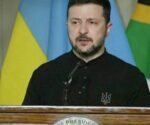Boy, 15, sent home from school with headache given heartbreaking diagnosis | UK | News
A teenager sent home from school with a headache was given a devastating diagnosis when checked over by doctors. Callum Stone, 15, was diagnosed with an “inoperable” brain tumour and his family are now searching for treatment options in other countries.
In January, Callum’s mother Sarah Ferris and step-father Mark Ferris were phoned by his school and asked to collect him. When Mark arrived, he said Callum, who was described by family as someone who is “very into his sport” and cycles to school every day, was struggling to speak properly.
Mark said: “He told me quite loudly in reception at school he loved me but he wasn’t getting his words out quite right, he wasn’t coming across as normal.”
He then took Callum to A&E in Chelmsford, Essex, but the teenager suffered three seizures on the way. After an inconclusive week in hospital, he was put into the care of Great Ormond Street Hospital for Children in London for further scans and tests, where he was diagnosed with a grade four brain tumour.
The tumour is growing “like a cobweb” in Callum’s brain, meaning it is impossible for doctors to operate on the Essex teenager.
Having explored other options, his family have said there are “no other options for him on the NHS” and have launched a GoFundMe page to raise money for potential treatments outside the UK.
The page has already raised more than £50,000, while Callum is focusing on his fitness and diet for the time being.
He told PA Real Life: “Starting off, it was a bit hard and I was a bit moody and quiet – but I’ve been feeling better lately. Eating well and exercising actually makes you feel a lot better and I’ve been walking the dog, riding my bike and going out to the gym.
“To others in my position, I’d say go out for walks with your family and keep telling lots of jokes.”
Sarah and Mark described Callum as an active teenager with a healthy lifestyle.
Mark added: “He’s been going to the gym and doing his own exercise, being very independent with it.
Sarah continued: “He cycles to school every day, he’s doing GCSE PE, he loves basketball.”
Events began on January 20, when Sarah received a call from Callum’s secondary school asking for someone to pick her son up after he complained of a headache in the medical room.
After Mark picked him up and noticed his abnormal speech, he took him to A&E at Broomfield Hospital in Chelmsford, but tests including a lumbar puncture, a CT scan and an MRI scan were inconclusive, though the latter showed slight inflammation on Callum’s brain.
Sarah said: “They thought it might be a viral infection.”
Callum was discharged with anti-seizure medication and his mum felt things were “back to normal”, before a follow-up appointment at Great Ormond Street Hospital showed a “large tumour” in his brain.
After undergoing a biopsy of the mass in February, his family were told he had a diffuse grade four glioma, a type of cancerous tumour which begins in the brain.
Sarah, Mark, Callum’s father and his step-mother all travelled into hospital to receive the “shattering” news, which they shared with Callum at home.
Sarah said: “In a matter of hours, our world has just completely been thrown upside down but a few months ago, we were just a normal family. It’s inoperable, it grows like a cobweb so they would need to take away too much of the healthy cells.”
She added: “It’s quite hard to explain something like that to a child and his brother.”
From February 24, Callum underwent a six-week course of radiotherapy at University College Hospital in London, completing this on April 4. The next stage is an MRI scan on May 5 to survey the tumour’s response to the treatment.
His mother continued: “He’s been very good, he’s been exercising and keeping in touch with his friends – he’s doing as well as you could be.
“There are times away from the kids where you didn’t think you could ever cry so hard but as soon as you see them, you want to start planning things, going out and seeing friends, family. They make it easier to get through the days.”
Alongside radiotherapy, Callum will begin ongoing chemotherapy treatment in tablet form next month, but Sarah said “there are no other treatment options for him on the NHS”, given his type of tumour.
She added: “We’re starting to look abroad with things that are quite specific to his condition. There’s a clinic in Germany, there are some clinical trials for things similar to Callum’s in San Francisco. We’re just looking for other options, we’re looking everywhere.”
Having passed £50,000 raised, Mark said it had been “emotional” and “lovely” to see the donations come in.
The NHS advises brain tumour symptoms vary depending on the exact part of the brain affected, but common types include headaches, seizures, persistent nausea, being sick, mental or behavioural changes, weakness or paralysis on one side of the body or vision or speech problems.
Their information page adds: “See a GP if you have these types of symptoms, particularly if you have a headache that feels different from the type of headache you usually get, or if headaches are getting worse.”
Brain tumours can affect people of any age, including children, though tend to be more common in older adults.
Around 12,000 people are diagnosed with a primary brain tumour in the UK each year, of which about half are cancerous.








